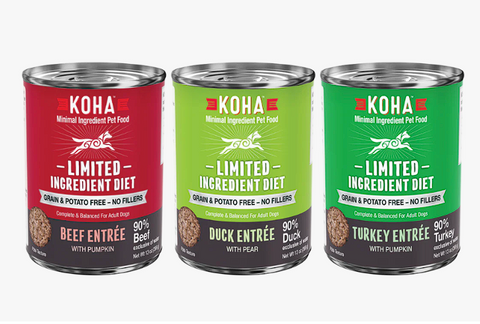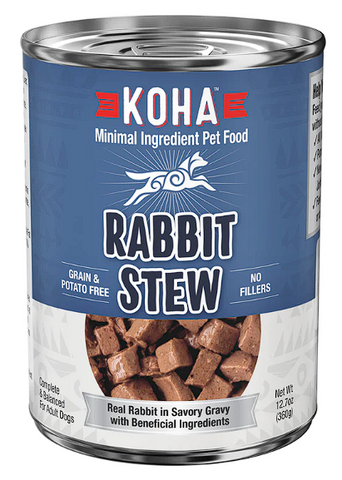![Food Intolerance in Dogs: Symptoms, Signs, & Treatment [2024]](http://kohapet.com/cdn/shop/articles/food-intolerance-in-dogs-800x533.jpg?v=1576179869&width=150) tips
tips
Food Intolerance in Dogs: Symptoms, Signs, & Treatment [2024]
Many pet foods advertise their products as “complete and balanced,” but that may not be enough if your dog has a food intolerance. If your dog is showing signs of intolerance, finding the right diet plan is important. Dealing with constant diarrhea and an upset stomach is no way for a dog or pet parent to live.
That’s why switching your dog to a food that does not cause these symptoms is your best chance to combat dog food intolerance or allergies.
Here are some tips for treating food intolerance in dogs.
What is Food Intolerance in Dogs?
If your dog is scratching or licking themselves frequently or suffering from gastrointestinal symptoms, they may have a food intolerance or allergy.
Food intolerance is a chronic condition in which your dog is unable to properly digest a certain ingredient. As a result, dogs who suffer from a food intolerance often experience gastrointestinal discomfort (including flatulence, diarrhea, or vomiting), itchy skin, or chronic foot or ear infections.
Food intolerance vs food sensitivities vs food allergies
Food intolerances or sensitivities are often confused with food allergies, which occur less frequently. So what’s the difference?
While food intolerance is a chronic condition resulting from a dog’s inability to digest certain foods, food allergies involve an immunological response, such as hives, swelling, itchiness, gastrointestinal symptoms, or, in worse cases, anaphylactic shock.
As you can tell, symptoms for the two conditions can overlap, making it hard to determine which is the cause of your canine’s symptoms. Dogs with allergic reactions build up antibodies against the trigger food, so allergies may only manifest after prolonged exposure to the food or ingredient.
Signs of Food Intolerances and Allergies in Dogs

[Source]
Even if your dog’s food intolerance or allergy isn’t immediately life-threatening, the associated symptoms affect their well-being and comfort. If you notice any of the following symptoms, talk to your vet about your dog’s diet.
Upset Stomach & Vomiting
Gastrointestinal symptoms are the most common food intolerance and allergy symptoms for dogs. If your dog frequently vomits or burps after eating, it may be a sign that they’re experiencing an upset stomach and might have an allergy or intolerance to their current food.
Skin Rashes & Itching
Ever heard the term “ears and rears”? It’s a term often used to describe commonly afflicted areas when your dog suffers from rashes and itching. Allergy- or intolerance-related itching can be more widespread, however, and if your dog is scratching often, you should talk to your vet.
Diarrhea
Diarrhea is another gastrointestinal symptom to watch out for. If your dog has loose or unformed stools more often than usual (the general benchmark is loose stools three or more times a day), you should investigate their food and talk to your vet. (If your pooch suffers instead from constipation, learn more about common causes of constipation and foods to help get things moving!)
Hair Loss
Also known as alopecia, fur or hair loss (depending on your dog’s breed) is often associated with allergies or intolerances. Some loss of fur is normal, but losing enough fur to reveal the skin underneath is not.
Ear Infections
Ear infections can be a symptom of food intolerance, although it’s not a direct result of allergies or intolerances. Infections are secondary symptoms often caused by your dog’s scratching and chewing to relieve their itchy skin. Make sure you take your dog to the vet to receive treatment for the infection alongside your change of food.
How to Manage & Treat Food Intolerances in Dogs
We know you want to alleviate your dog’s symptoms and improve their quality of life as soon as possible so they can get back to their normal, happy self.
Here are some steps you can take to address food intolerances in dogs:
1. Switch to a Limited Ingredient Diet Dog Food

The first thing to do is switch your dog to a limited ingredient diet dog food. Limited ingredient foods include meats like duck, pork, or beef and limited additional ingredients like green mussel and pumpkin, limiting exposure to several ingredients that could cause issues for your dog. This helps you and your dog avoid potential allergies to unnecessary fillers and allows you more control over their nutrition.
Changing their food to a brand that includes high-quality animal proteins and limited beneficial ingredients can help reduce digestive issues.
For example, KOHA’s limited ingredient products offer nutrition without all the junky fillers. Their limited ingredient diet entrées are composed of 90% meat and include minimal secondary ingredients known to support canine health.
Explore tasty limited ingredient meals for your dog!
2. Make Sure it’s Not Food Allergies
The main cause of dog digestive problems can be either food intolerance or food allergies. Dogs suffering from dog food intolerance usually suffer through digestive issues while dogs with allergies tend to exhibit symptoms such as flaky skin, constant itching and scratching, rashes, and vomiting (though symptoms for allergies can also include diarrhea, nausea, and other stomach issues).
Even if you think you’ve figured out what ingredient or ingredients might be the source of your dog’s issues, check with your vet before making any changes to your dog’s diet.
Learn more about the best dog foods to address food allergies.
3. Pick a Food with Novel Protein

Novel proteins are excellent for dogs with food intolerance and sensitivities. Novel proteins are protein sources that have not been previously fed to your pet, as opposed to staple choices like beef, poultry, pork, and tuna.
KOHA offers a variety of novel protein foods for your pooch. Choose from duck, rabbit, salmon, or lamb for your dog’s entrée and top off their meal with the Elk & Venison Raw Topper!
Watching a pet suffer from dog food intolerance is never easy, but with these tips, you can help your dog find a diet that makes him happy and healthy.
More About Food Intolerance in Dogs
Interested in learning more about food intolerance in dogs? Below we answer several frequently asked questions about dog food sensitivities and address common concerns.
Is my dog sensitive to a certain food?
If your pup exhibits gastrointestinal distress or scratches themselves excessively, they might have a food sensitivity or food allergy. Determining which food they’re sensitive to can take time, since it may take up to 8-12 weeks of using a new diet to determine if it’s effective for your dog.
Is there a dog food intolerance test?
While several companies market pet allergy tests, many commercial blood and saliva tests aren’t validated, meaning they haven’t shown results indicating actual clinical changes in pets.
It’s tempting to find fast, simple methods of determining your dog’s sensitivities, since you want to alleviate their suffering as soon as possible. The gold standard for diagnosing or ruling out allergies and intolerances is an elimination diet and “re-challenge,” or re-introduction of an ingredient to determine if a reduction of symptoms was simply a coincidence rather than food-related allergens.
How do I know if my dog has a food intolerance?
Changes in behavior or general health are often strong indicators that something is wrong with your pooch.
Signs of food intolerance include:
- Digestive upset (including vomiting or diarrhea)
- Itchy skin, paws, or ears
- Changes in energy levels
- Weight loss
- Aggression
However, it’s important to consult your vet to rule out any other underlying conditions and to discuss possible changes in your dog’s food.
How do you fix a dog with food intolerance?
One of the best ways to manage food intolerances is by updating your dog’s diet. Consult with your vet to determine the best dietary changes for your dog.
What is the most common dog food sensitivity?
The most common dog food sensitivities are beef, dairy products, chicken, wheat, and lamb. Less commonly-reported food sensitivities include soy, corn, egg, pork, fish, and rice.
Some other ingredients that cause stomach upset include meat by-products, starches, chemically-altered proteins, and artificial preservatives. If your pup has a sensitive stomach, try some sensitive dog food recipes.
What do you feed a dog with food intolerance?
If your dog is suffering from symptoms of food intolerance or allergies, you have options for helping them feel better with tasty and nutritious food.
Some of the best options for dogs with food intolerance include:
- Bland diets: A bland diet for dogs is a meal plan that’s low in fat and contains easily digestible carbohydrates. They usually include lean protein sources and carbohydrates. Protein, essential for healing and recovery, is often provided through boiled chicken (without the skin and bones) or beef.
- Novel protein foods: Novel proteins are proteins that your dog wouldn’t have been exposed to before and can include foods like elk, venison, duck, or fish.
- Limited-ingredient foods: These foods contain minimal ingredients so you can avoid junky fillers and control the ingredients you and your dog test on their system.
Manage Your Dog’s Food Intolerance with the Right Diet
Your dog deserves to live a happy, healthy life free of troublesome symptoms due to food intolerance or food allergies. Luckily, you can help your best friend manage their food intolerance with simple dietary changes!
KOHA is dedicated to helping dogs achieve optimal health with high-quality food that even picky pets enjoy.
Check out KOHA’s Recipe Guide for Dogs to help you find the best meal options for your dog’s needs!

